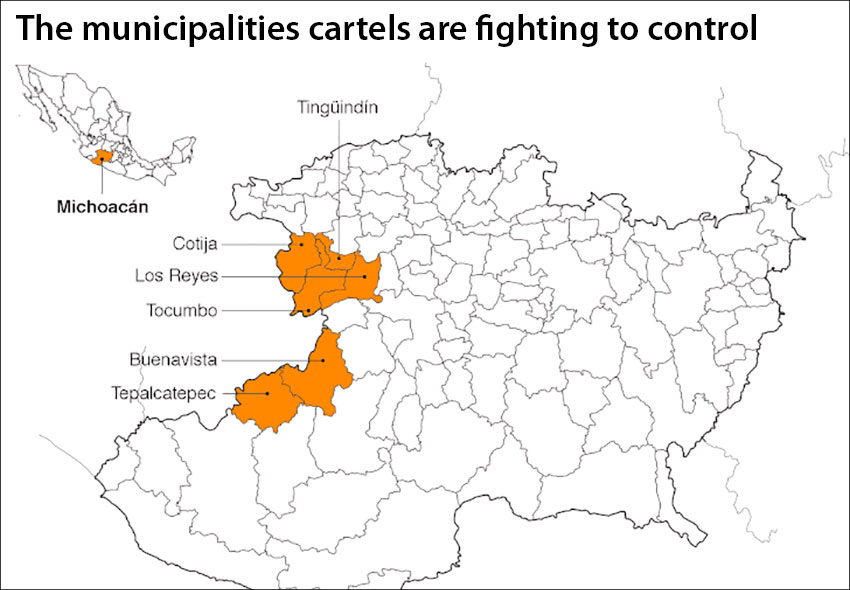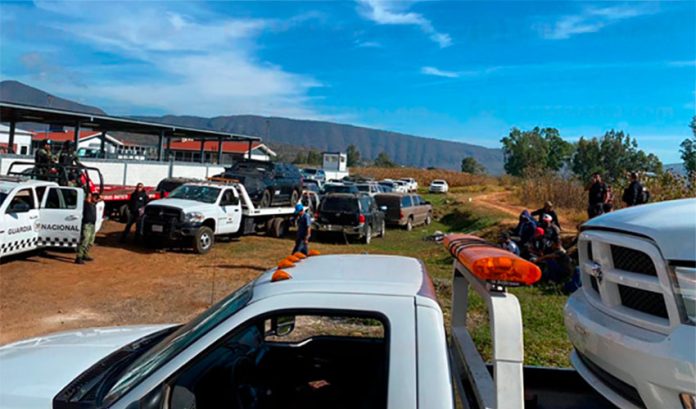Firefights between the Jalisco New Generation Cartel (CJNG) and rival criminal group Cárteles Unidos raged in four municipalities in western Michoacán on Wednesday night, leaving six dead, two arrested and several vehicles and weapons abandoned and confiscated by police.
Members of the two cartels moved between Los Reyes, Cotija, Tocumbo and Tingüindín at different times and exchanged fire between each other or with security forces for extended periods beginning late Wednesday afternoon and into the evening.
In the first community targeted, Los Reyes, cartel hitmen arrived Wednesday around 5 p.m. in about 40 vehicles and began a bloody shootout as the CJNG attacked a Cárteles Unidos safe house, leaving five people dead. Six persons were also taken hostage, according to local media, although this was not confirmed by security officials.
It appears that the Cárteles Unidos, an alliance of the Sinaloa Cartel and other criminal organizations, were at least temporarily victorious in Los Reyes, as authorities later found a message there directed at CJNG leader Nemesio Osguera “El Mencho” Cervantes.
“Here in Los Reyes, don’t come in, Mencho. Tell your people to come get your narco-tanks; we left them full,” it said.
A glimpse of the lethal back & forth the Michoacán-Jalisco border area has been under for years – and that's only picking up steam as we near next year's elections. 100s of displaced just these past four weeks – and thus far no notable coverage of this acute humanitarian crisis. https://t.co/FUq08TbStj
— Falko Ernst (@falko_ernst) December 4, 2020
CJNG forces eventually moved on to the municipalities of Cotija, Tocumbo and Tingüindín where local media reported a total of seven more people killed. However, the state Ministry of Public Security said that only six people were killed in total.
The ministry also reported a separate incident in Tingüindín, where they said there was an armed confrontation between civilians. Footage online purportedly filmed at the incident, however, shows state police forces in a shootout with unseen gunmen.
Security forces also came under attack by a sniper near Cotija the next morning as they were towing confiscated vehicles on the Tocumbo-Cotija highway. According to police, the unknown sniper attacked from a distant hill, injuring a police officer in the foot.
The man was hospitalized and was in stable condition, said Michoacán Public Security Minister Israel Patrón Reyes. No one else was injured in the attack, and authorities quickly regained control of the situation, Patrón said.
As of yesterday, state and federal security officials were regularly patrolling the communities where the shootouts took place, all located near the state of Jalisco border, at the request of residents.
All four municipalities where the shootouts occurred — as well as the nearby municipalities of Buenavista, Coalcóman and Tepalcatepec — where residents recently dug trenches in the roads to prevent CJNG members from taking control of their community — are widely considered disputed territory between the two cartels.

Over the last several weeks at least 500 people in communities around the municipalities of Aguililla and Buenavista, fearing for their lives, have abandoned their homes, and another cartel cell, Blancos de Troya, has taken over the towns over and based its operations there. In Tepalcatepec, according to police reports made public, citizens have been warned to barricade their homes and the entrance to their community in anticipation of an eruption of cartel violence.
Meanwhile, in several communities in coastal Michoacán, where the Cárteles Unidos have an alliance with a local gang leader, Juan José “El Abuelo” Fariás, the situation is similar.
According to one observer, the escalating violence has left the state worse than it was when self-defense groups formed in the absence of official action against criminal activity.
“We are worse off than before,” Hipólito Mora, founder of the state’s self-defense groups, told the newspaper Milenio, explaining that violence has escalated steadily since 2014.
“The people are afraid because they see that organized crime is growing more powerful than the authorities. The police, the federal forces are going crazy, not knowing where to run because everywhere you look there are confrontations,” Mora said.
He accused authorities of knowing who the leaders of the crime groups in Michoacán are but doing nothing to arrest them.
“I think that the violence will grow even more,” he said. “The issue doesn’t seem to matter to the politicians.”
